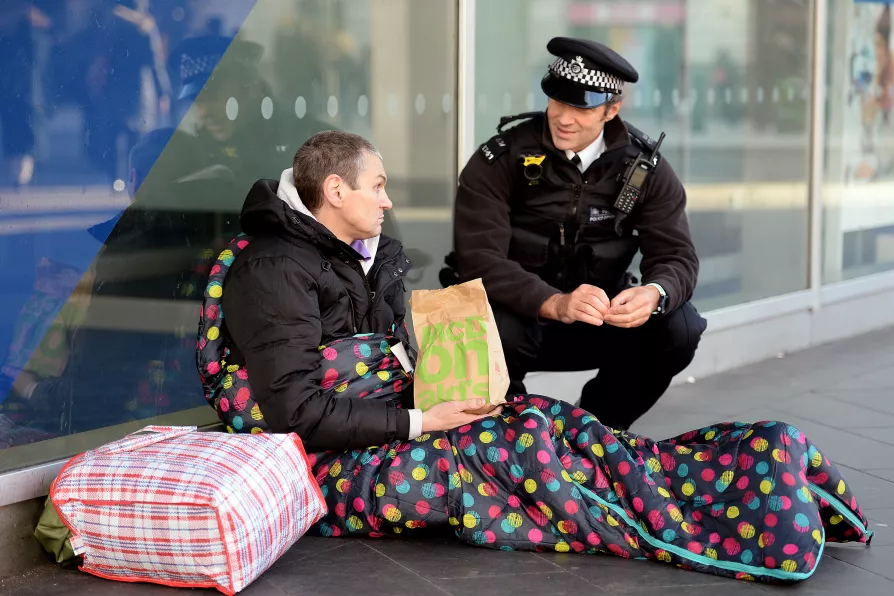
 A police officer talking with a homeless man in Victoria, London, January 16, 2020
A police officer talking with a homeless man in Victoria, London, January 16, 2020
CHARITIES rightly identify the extreme threat to women’s safety posed by the government’s plans to criminalise homelessness.
But so shocking is the legislation — which has already passed two readings in the House of Commons — that it should provoke uproar for its impact on all homeless people.
Ministers say they want to deter “aggressive begging.”
The reality is that they want to hide the consequences of the deprivation their policies have inflicted on ever larger numbers.
Back in the 1980s, another decade of Tory-administered social destruction that fuelled soaring homelessness and saw the withdrawal of essential services (such as by proffering often non-existent “care in the community” in place of inpatient psychiatric care), Tory minister George Young reportedly described the homeless as “the people you step over when you come out of the opera.”
But now the homeless are highly visible, everywhere. Fourteen years of “austerity” have blighted lives.
Aggressive cuts to council budgets have shuttered the youth centres that provided so many young people from deprived areas with alternatives to the streets, and many of the libraries, leisure and sports facilities that helped them develop skills. Life chances are ruined even at school when children are too hungry to concentrate on their lessons.
Safety nets have been shredded for those who lose security later on, too. Women’s refuges have closed or lost access to local government funding as the cash runs dry.
All these problems are about to get worse: the dramatic bankruptcy of Britain’s biggest local authority, Birmingham, followed by last month’s devastating cuts budget, is just the beginning. The battle for basic municipal infrastructure and services is about to erupt in towns and cities right across Britain.
At the same time the cost of housing has soared. Britain’s under-regulated private rental sector — which the Tories have once again backed away from reforming — leaves millions at the mercy of landlords who can hike rents at will, and evict them on a whim.
Home ownership is increasingly a fantasy with average houses costing nine times a typical annual wage, while housing supply is constricted because of the domination of a handful of land-banking construction firms that profit from scarcity.
All that has driven a steady rise in homelessness, now 74 per cent higher than it was in 2010. In its less desperate form, it has placed an additional burden on cash-strapped councils, who are forced to find expensive lodgings for those without a roof over their heads — last year the spend hit £1.7 billion, and London boroughs reported a 40 per cent rise in spending on temporary accommodation for the homeless in a single year.
In its most desperate, it drives people onto the streets. Tents and sleeping bags line our high streets. Beggars ask for help at bus stops and on public transport, a task made more difficult by the shift from cash to card payments across the economy. These miserable scenes are a living witness to the breakdown of social security under the Tories.
Their answer is to sweep it under the carpet. Suella Braverman failed to get her signature plan to ban giving tents to the homeless into the King’s Speech, but current legislation pushed by James Cleverly is no better, criminalising “nuisance rough sleeping” and authorising police to arrest people for having an “excessive smell.”
Even Tories are beginning to baulk at the irrationality of these plans. As MP Nickie Aiken asked, how is a homeless person supposed to pay the proposed £2,500 fine for sleeping rough?
But the plans are not intended to solve a problem, merely to move it out of public view.
The charities demanding a rethink deserve support across the labour movement — and the government, seeking to punish the most vulnerable for social problems of its own making, must be removed before its ever crazier, ever crueller laws do even more damage.













